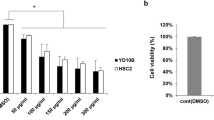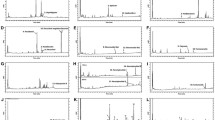Abstract
Areca nut chewing habits are associated with several oral manifestations like leukoplakia, submucous fibrosis and oral squamous cell carcinoma. Although numerous evidence on areca toxicity is known but the mechanistic pathway of disease causation is to be studied. Aqueous areca nut extract treated A549 cells showed reduced cell viability by 48 h with IC50 value of 0.50%. The toxic nature of areca nut induced the production of reactive oxygen species with decreased anti-oxidant glutathione S transferase levels lead to altered redox homeostasis. PCR studies showed decreased mRNA levels of Jun and Fos AP-1 subunits on extract treatment by 48 h. The protein levels of PCNA, CDK4, RB, p53, c-Jun and c-Fos were found to be downregulated with upregulated CDK inhibitor p21 on extract treatment as compared to control. Results of FACS analysis further confirm G1/S phase cell cycle arrest on areca nut extract exposure. The regulation of downstream AP-1 subunits by MAPKs was studied by using specific inhibitors of ERK, JNK and p38 along with areca nut extract. Results showed the redox activation of MAP kinases down regulated the mRNA levels of AP-1 subunits in aqueous areca nut extract treated cells. Hence the present study aids in elucidating the role of MAP kinases in regulating the AP-1 subunits and their implications on target genes that are involved regulation of various cellular processes. Further, it would help in understanding the mechanistic aspects of the diseased state which may facilitate in designing of new therapeutic modalities that could help in cancer management.










Similar content being viewed by others
Abbreviations
- ANE:
-
Areca nut extract
- AP-1:
-
Activator protein-1
- CDK:
-
Cyclin dependent kinase
- PCNA:
-
Proliferative cell nuclear antigen
- RB:
-
Retinoblastoma
- RT-PCR:
-
Semi quantitative reverse transcriptase-Polymerase Chain Reaction
References
Angel P, Karin M (1991) The role of Jun, Fos and the AP-1 complex in cell-proliferation and transformation. Biochem Biophys Acta 1072:129–157
Blagosklonny MV, Pardee AB (2002) The restriction point of the cell cycle. Cell Cycle 1:103–110
Bradford MM (1976) A rapid and sensitive method for the quantitation of microgram quantities of protein utilizing the principle of protein-dye binding. Anal Biochem 72:248–254
Canniff JP, Harvey W, Harris M (1986) Oral submucous fibrosis: its pathogenesis and management. Br Dent J 160:429–434
Chang KW, Lin SC, Kwan PC, Wong YK (2000) Association of aberrant p53 and p21(WAF1) immunoreactivity with the outcome of oral verrucous leukoplakia in Taiwan. J Oral Pathol Med 29:56–62
Chang MC et al (2001) Areca nut extract and arecoline induced the cell cycle arrest but not apoptosis of cultured oral KB epithelial cells: association of glutathione, reactive oxygen species and mitochondrial membrane potential. Carcinogenesis 22:1527–1535
Chang MC et al (2004) The induction of prostaglandin E2 production, interleukin-6 production, cell cycle arrest, and cytotoxicity in primary oral keratinocytes and KB cancer cells by areca nut ingredients is differentially regulated by MEK/ERK activation. J Biol Chem 279:50676–50683. https://doi.org/10.1074/jbc.M404465200
Chen G, Hsieh M-Y, Chen AW-G, Kao NH-L, Chen M-K (2018) The effectiveness of school educating program for betel quid chewing: a pilot study in Papua New Guinea. J Chin Med Assoc 81:352–357. https://doi.org/10.1016/j.jcma.2017.10.001
Chinenov Y, Kerppola TK (2001) Close encounters of many kinds: Fos-Jun interactions that mediate transcription regulatory specificity. Oncogene 20:2438. https://doi.org/10.1038/sj.onc.1204385
Clutton S (1997) The importance of oxidative stress in apoptosis. Br Med Bull 53:662–668
Cook JA, Gius D, Wink DA, Krishna MC, Russo A, Mitchell JB (2004) Oxidative stress, redox, and the tumor microenvironment. Semin Radiat Oncol 14:259–266. https://doi.org/10.1016/j.semradonc.2004.04.001
Halliwell B (2007) Oxidative stress and cancer: have we moved forward? Biochem J 401:1–11. https://doi.org/10.1042/bj20061131
Hsu JC, Cressman DE, Taub R (1993) Promoter-specific trans-activation and inhibition mediated by JunB. Cancer Res 53:3789–3794
IARC (1985) Betel-quid and areca-nut chewing. IARC Monogr Eval Carcinog Risk Chem Hum 37:137–202
Jeng JH, Hahn LJ, Lin BR, Hsieh CC, Chan CP, Chang MC (1999) Effects of areca nut, inflorescence piper betle extracts and arecoline on cytotoxicity, total and unscheduled DNA synthesis in cultured gingival keratinocytes. J Oral Pathol Med 28:64–71
Jeng JH, Chang MC, Hahn LJ (2001) Role of areca nut in betel quid-associated chemical carcinogenesis: current awareness and future perspectives. Oral Oncol 37:477–492
Ji WT, Yang SR, Chen JY, Cheng YP, Lee YR, Chiang MK, Chen HR (2012) Arecoline downregulates levels of p21 and p27 through the reactive oxygen species/mTOR complex 1 pathway and may contribute to oral squamous cell carcinoma. Cancer Sci 103:1221–1229. https://doi.org/10.1111/j.1349-7006.2012.02294.x
Jochum W, Passegue E, Wagner EF (2001) AP-1 in mouse development and tumorigenesis. Oncogene 20:2401–2412. https://doi.org/10.1038/sj.onc.1204389
Kiran Kumar KM et al (2016) Cadmium induces oxidative stress and apoptosis in lung epithelial cells. Toxicol Mech Methods 26:658–666. https://doi.org/10.1080/15376516.2016.1223240
Kovary K, Bravo R (1991) The jun and fos protein families are both required for cell cycle progression in fibroblasts. Mol Cell Biol 11:4466–4472
Laird AD, Shalloway D (1997) Oncoprotein signalling and mitosis. Cell Signal 9:249–255
Lee JJ et al (2005) Higher expressions of p53 and proliferating cell nuclear antigen (PCNA) in atrophic oral lichen planus and patients with areca quid chewing. Oral Surg Oral Med Oral Pathol Oral Radiol Endod 99:471–478. https://doi.org/10.1016/j.tripleo.2004.10.018
Li JM, Brooks G (1999) Cell cycle regulatory molecules (cyclins, cyclin-dependent kinases and cyclin-dependent kinase inhibitors) and the cardiovascular system; potential targets for therapy? Eur Heart J 20:406–420
Lin SC, Chang KW, Chang CS, Liu TY, Tzeng YS, Yang FS, Wong YK (2000) Alterations of p16/MTS1 gene in oral squamous cell carcinomas from Taiwanese. J Oral Pathol Med 29:159–166
Liu TY, Chen CL, Chi CW (1996) Oxidative damage to DNA induced by areca nut extract. Mutat Res 367:25–31
Lu SY, Chang KW, Liu CJ, Tseng YH, Lu HH, Lee SY, Lin SC (2006) Ripe areca nut extract induces G1 phase arrests and senescence-associated phenotypes in normal human oral keratinocyte. Carcinogenesis 27:1273–1284. https://doi.org/10.1093/carcin/bgi357
Lu HH, Kao SY, Liu TY, Liu ST, Huang WP, Chang KW, Lin SC (2010) Areca nut extract induced oxidative stress and upregulated hypoxia inducing factor leading to autophagy in oral cancer cells. Autophagy 6:725–737
Mannervik B (1985) The isoenzymes of glutathione transferase. Adv Enzymol Relat Areas Mol Biol 57:357–417
Mechta F, Lallemand D, Pfarr CM, Yaniv M (1997) Transformation by ras modifies AP1 composition and activity. Oncogene 14:837–847. https://doi.org/10.1038/sj.onc.1200900
Mosmann T (1983) Rapid colorimetric assay for cellular growth and survival: application to proliferation and cytotoxicity assays. J Immunol Methods 65:55–63
Nagesh R et al (2016) Aqueous areca nut extract induces oxidative stress in human lung epithelial A549 cells: probable role of p21 in inducing cell death. Gene Rep 6:103–111. https://doi.org/10.1016/j.genrep.2016.12.008
Passegue E, Wagner EF (2000) JunB suppresses cell proliferation by transcriptional activation of p16(INK4a) expression. EMBO J 19:2969–2979. https://doi.org/10.1093/emboj/19.12.2969
Periyakaruppan A et al (2009) Uranium induces apoptosis in lung epithelial cells. Arch Toxicol 83:595–600. https://doi.org/10.1007/s00204-008-0396-5
Schnelldorfer T, Gansauge S, Gansauge F, Schlosser S, Beger HG, Nussler AK (2000) Glutathione depletion causes cell growth inhibition and enhanced apoptosis in pancreatic cancer cells. Cancer 89:1440–1447
Shackelford RE, Kaufmann WK, Paules RS (1999) Cell cycle control, checkpoint mechanisms, and genotoxic stress. Environ Health Perspect 107:5–24
Sharma SC, Clemens JW, Pisarska MD, Richards JS (1999) Expression and function of estrogen receptor subtypes in granulosa cells: regulation by estradiol and forskolin. Endocrinology 140:4320–4334. https://doi.org/10.1210/endo.140.9.6965
Shaulian E, Karin M (2001) AP-1 in cell proliferation and survival. Oncogene 20:2390–2400. https://doi.org/10.1038/sj.onc.1204383
Shaulian E, Karin M (2002) AP-1 as a regulator of cell life and death. Nat Cell Biol 4:E131–E136. https://doi.org/10.1038/ncb0502-e131
Shaulian E, Schreiber M, Piu F, Beeche M, Wagner EF, Karin M (2000) The mammalian UV response: c-Jun induction is required for exit from p53-imposed growth arrest. Cell 103:897–907
Smith ML, Fornace AJ Jr (1996) Mammalian DNA damage-inducible genes associated with growth arrest and apoptosis. Mutat Res 340:109–124
Sundqvist K, Liu Y, Nair J, Bartsch H, Arvidson K, Grafstrom RC (1989) Cytotoxic and genotoxic effects of areca nut-related compounds in cultured human buccal epithelial cells. Cancer Res 49:5294–5298
Tseng YH, Chang CS, Liu TY, Kao SY, Chang KW, Lin SC (2007) Areca nut extract treatment down-regulates involucrin in normal human oral keratinocyte through P13K/AKT activation. Oral Oncol 43:670–679. https://doi.org/10.1016/j.oraloncology.2006.08.003
Vahrmeijer AL, van Dierendonck JH, Schutrups J, van de Velde CJ, Mulder GJ (1999) Effect of glutathione depletion on inhibition of cell cycle progression and induction of apoptosis by melphalan (l-phenylalanine mustard) in human colorectal cancer cells. Biochem Pharmacol 58:655–664
Waris G, Ahsan H (2006) Reactive oxygen species: role in the development of cancer and various chronic conditions. J Carcinog 5:14. https://doi.org/10.1186/1477-3163-5-14
Wisdom R (1999) AP-1: one switch for many signals. Exp Cell Res 253:180–185. https://doi.org/10.1006/excr.1999.4685
World Health Organization ROftWP (2012) Review of areca (betel) nut and tobacco use in the Pacific: a technical report WHO Regional Office for the Western Pacific. Philippine, Manila
Acknowledgements
The authors wish to express their gratitude to the University Grant Commission-Centre with Potential for Excellence Area (UGC-CPEPA) [8-2/2008(NS/PE)] and Department of Science and Technology-Promotion of University Research and Scientific Excellence (DST-PURSE) [SR/59/Z-23/2010/38(c)], New Delhi for providing financial support. Author RN is grateful to UGC-CPEPA for providing fellowships. Authors also wish to express their gratitude to the Department of Microbiology and Biotechnology, Bangalore University, Bengaluru, for providing the DST-FIST, UGC-SAP and department instrumentation facility.
Author information
Authors and Affiliations
Corresponding author
Ethics declarations
Conflict of interest
Authors declare that there are no conflicts of interest.
Additional information
Publisher's Note
Springer Nature remains neutral with regard to jurisdictional claims in published maps and institutional affiliations.
S. Chidananda Sharma—Deceased.
Rights and permissions
About this article
Cite this article
Nagesh, R., Kiran Kumar, K.M., Naveen Kumar, M. et al. Stress activated p38 MAPK regulates cell cycle via AP-1 factors in areca extract exposed human lung epithelial cells. Cytotechnology 71, 507–520 (2019). https://doi.org/10.1007/s10616-019-00297-3
Received:
Accepted:
Published:
Issue Date:
DOI: https://doi.org/10.1007/s10616-019-00297-3




